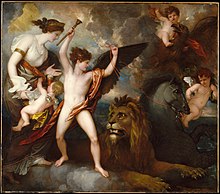Cupid
Roman deity, counterpart of Eros
In classical mythology, Cupid (Latin Cupīdō [kʊˈpiː.doː], meaning "desire") is the god of desire, erotic love, attraction and affection. He is often portrayed as the son of the love goddess Venus and the war god Mars.

And let your arrow go
Straight to my lover's heart for me
For me...
Cupid please hear my cry
And let your arrow fly
Straight to my lover's heart for me.
~Sam Cooke, Cupid (1961).


And therefore is winged Cupid painted blind.
Nor hath love’s mind of any judgement taste;
Wings and no eyes figure unheedy haste.
And therefore is love said to be a child
Because in choice he is so oft beguiled. ~ William Shakespeare in A Midsummer Night's Dream

At cards for kisses—Cupid paid... ~ John Lyly

Concludes with Cupid's curse:
They that do change old love for new,
Pray gods, they change for worse! ~ George Peele
Quotes
edit- CUPID, n. The so-called god of love. This bastard creation of a barbarous fancy was no doubt inflicted upon mythology for the sins of its deities. Of all unbeautiful and inappropriate conceptions this is the most reasonless and offensive. The notion of symbolizing sexual love by a semisexless babe, and comparing the pains of passion to the wounds of an arrow -- of introducing this pudgy homunculus into art grossly to materialize the subtle spirit and suggestion of the work -- this is eminently worthy of the age that, giving it birth, laid it on the doorstep of prosperity.
- Ambrose Bierce, The Cynic's Dictionary (1906); republished as The Devil's Dictionary (1911).
- When Adam long ago in Cupid's awful court
(For Cupid ruled ere Adam was invented)
Sued for Eve's favor, says an ancient law report,
He stood and pleaded unhabilimented.
"You sue in forma pauperis, I see," Eve cried;
"Actions can't here be that way prosecuted."
So all poor Adam's motions coldly were denied:
He went away -- as he had come -- nonsuited.- Ambrose Bierce, "Forma pauperis", The Cynic's Dictionary (1906); republished as The Devil's Dictionary (1911).
- Voiture belonged to a race of poets essentially French, who sacrificed to the Graces instead of the Muses; to whom Cupid, with his wings and arrows, was the ideal of love, and whose art of poetry consisted in epigram, tournure, readiness, and facility.
- Letitia Elizabeth Landon, Francesca Carrara (1834), Vol. 1, Ch. 21.
- Cupid draw back your bow
And let your arrow go
Straight to my lover's heart for me
For me...
Cupid please hear my cry
And let your arrow fly
Straight to my lover's heart for me.
- Let Cupid smile and the fiend must flee;
Hey and hither, my lad.- Robert Graves, "Love and Black Magic", Fairies and Fusiliers (1917).
- Who worships Cupid doth adore a boy;
Boys' earnest are at first in their delight,
But for a new soon leave their dearest toy,
And out of mind as soon as out of sight;
- Their joys be dallyings and their wealth is play,
- They cry to have and cry to cast away.
- Fulke Greville, 1st Baron Brooke, Caelica (1633), LXII.
- Cupid and my Campaspe play'd
At cards for kisses—Cupid paid:
He stakes his quiver, bow, and arrows,
His mother's doves, and team of sparrows;
Loses them too; then down he throws
The coral of his lips, the rose
Growing one's cheek (but none knows how);
With these, the crystal of his brow,
And then the dimple of his chin:
All these did my Campaspe win.
At last he set her both his eyes—
She won, and Cupid blind did rise.
O Love! has she done this for thee?
What shall, alas! become of me?- John Lyly, Cupid and Campaspe (c. 1584).
- My merry, merry, merry roundelay
Concludes with Cupid's curse:
They that do change old love for new,
Pray gods, they change for worse!- George Peele, Cupid's Curse, Lines 12-13 (date uncertain), reported in Bartlett's Familiar Quotations, 10th ed. (1919).
- What thing is love?—for (well I wot) love is a thing
It is a prick, it is a sting,
It is a pretty, pretty thing;
It is a fire, it is a coal,
Whose flame creeps in at every hole!- George Peele, "The Hunting of Cupid" (1591).
- This house is to be let for life or years;
Her rent is sorrow, and her income tears.
Cupid, 't has long stood void; her bills make known,
She must be dearly let, or let alone.- Francis Quarles, Emblems (1635), Book I, no. 10, Epigram 10.
- Love looks not with the eyes, but with the mind,
And therefore is winged Cupid painted blind.
Nor hath love’s mind of any judgement taste;
Wings and no eyes figure unheedy haste.
And therefore is love said to be a child
Because in choice he is so oft beguiled.- William Shakespeare, A Midsummer Night's Dream (c. 1595-96), Helena, scene i.
- Alfin s'invecchia amore
Senza quest' arti, e divien pigro e lento,
Quasi destrier che men veloce corra,
Se non ha chilo segua, o chi 'l precorra.- For love she wist was weak without those arts,
And slow; for jealousy is Cupid's food;
For the swift steed runs not so fast alone,
As when some strain, some strive him to outgone.- Torquato Tasso, Gerusalemme Liberata (1581), Canto V, stanza 70 (tr. Fairfax).
- For love she wist was weak without those arts,